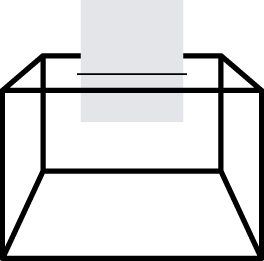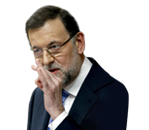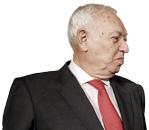Why Catalans want to decide on their future in a referendum
1
On 9 November, Catalonia made a new peaceful, civic protest to claim its right to decide its political future, against the Spanish Government's blockade.
Cristina Calderer
2,3 million Catalans took part on a symbolic vote to claim its right to decide on its political future.
81% of participants voted Yes to independence. Those in favour of Catalonia becoming a state within Spain (federal option) were 10% of votes. Finally, 4,5% voted in favor of making no changes to the current situation, wanting Catalonia to remain an autonomous region within Spain.
CONSULTATION ON CATALAN SELF-RULE 2014
Do you want Catalonia to become a state?
xYES
If so,
Do you want that state to be independent?
xYESxNO
xNO
On the 12th of December 2013, a majority of Catalan political forces, grouped together dubbed as the pro-sovereignty block, agree to hold a consultative poll on the 9th of November 2014.
Pere Virgili
“Something as complex and emotional as national identity cannot be reduced to a purely legal issue”
"Catalonia and Spain are moving apart at a fast pace, and very little is being done to bring them back together"
"It is a game of chicken’ between Prime Minister Mariano Rajoy and Catalan leader Artur Mas"
CNN / al-jazeera / ARABASSAS / France24 / V7 / La Sexta / BBC / TVE / The Guardian. Per marta masedeu
2
In June 2010 the Spanish Constitutional Court cut back the Statute of Autonomy, Catalonia’s basic institutional regulation which the Catalans had voted on in a referendum after an agreement with the Spanish state that broadened and safeguarded Catalan powers. Since then, the Catalans have taken to the streets in ever larger numbers to demonstrate.
Cristina Calderer

A turning point was the 11th of September 2012. More than a million people took part in a demonstration in the centre of Barcelona and most of them demanded independence.
Celia Atset

The 11th of September 2013. Inspired by the Baltic Way in 1989, the Assemblea Nacional Catalana (Catalan National Assembly), called for a giant human chain extending from north to south through the country.
Santi Iglesias

The 11th of September 2014. Multitudes of Catalans made up the shape of a V (for vote and victory) in a mosaic that filled two of Barcelona’s main thoroughfares: the Diagonal and the Gran Via.
Manolo Garcia
3
Unlike Scotland, the Catalan process is driven by the people. Mass mobilization has forced political parties to take a stand and demand a referendum. The consultation has the support of the President of the Generalitat and a majority in the Catalan Parliament.
Cristina Calderer
Proposal of the new Statute of Autonomy of Catalonia
30th of September 2005
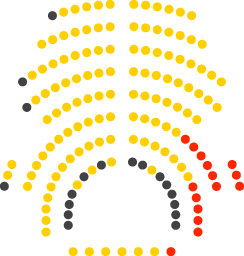
votes in favour: 120
votes against: 15
abstentions
Article 1: Catalonia is a nation
Declaration of Sovereignty and the Right to Decide of the Catalan People
23rd of January 2013
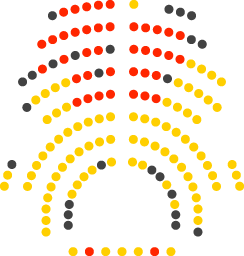
votes in favour: 85
votes against: 41
abstentions: 2
“In accordance with the majority will as expressed democratically by the people of Catalonia, the Parliament of Catalonia agrees to initiate a process to exert the right to decide in order for the citizens of Catalonia to decide their collective political future”
Resolution on the right to decide
13th of March 2013
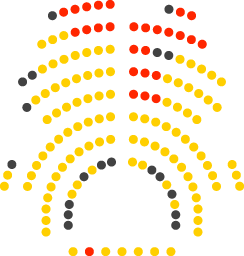
votes in favour: 104
votes against: 27
abstentions: 3
"To initiate negotiations with the Spanish government in order to facilitate the holding of a consultation with Catalan citizens on their future"
4
The Spanish government, appealing to the Spanish constitution, does not recognise Catalonia as a political subject and refuses to recognise its right to self-determination. Despite its international impact, the European Commission considers this to be an internal affair of a member state and avoids adopting an official position on the issue.
P.Hanna / Reuters
25th of March 2014
“Only the Spanish people is sovereign in an exclusive and indivisible way. No fraction of this population can be considered sovereign”.
An extract from the sentence
"The Constitution is based on the indissoluble unity of the Spanish nation and any attempt to dissolve it is radically contrary to the Constitution"
Mariano Rajoy, President of the Spanish Government
8th of April 2014
”It is impossible to give the Catalan parliament what it is asking for because the constitution does not allow it”
Mariano Rajoy, President of the Spanish Government
“A unilateral declaration of independence will condemn Catalonia to wander through space without recognition for ever"
José Manuel García-Margallo, Minister of Foreign Affairs
29th of September 2014
"All resolutions and orders dictated in the application of the impugnated normative and decree under appeal are hereby suspended"
An extract from the sentence
“Our interest is to make Catalan students more Spanish to make them proud of being both Catalan and Spanish”
José Ignacio Wert, Minister of Education
4th of November 2014
“Suspending all the challenged acts and other actions in preparation of a consultation or those related to it”
An extract from the sentence
5
For decades, Catalonia has attempted to transform Spain without success. The crisis has accentuated the economic suffocation that the state has inflicted on one of its economic engines. The fiscal deficit -the difference between what it sends to and what it receives from the central government has been one of the rallying points of Catalan civil society. The mutilation of the Catalan Statute of Autonomy, the opposition to the referendum and the attacks on Catalan language and culture have served to accelerate this disaffection.
Getty
Centre d'Estudis d'Opinió (2006-2014)





President Mas' goal is to use the unofficial consultation on 9-N to offer to the Spanish president, Mariano Rajoy, the chance to negotiate a proper referendum on the independence of Catalonia, like the one which took place in Scotlamd.

Both Mas and Junqueras agree that independence has to be proclaimed in the next Parliament, but they have different views on how and when this proclamation should take place.
